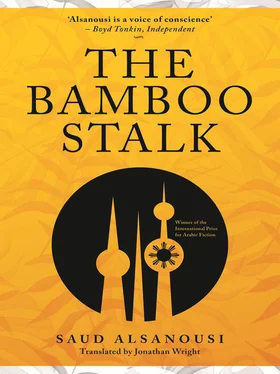All the cars were gone from the open space opposite the mosque, except for one or two. I walked slowly towards the door. There were shoes and sandals piled on top of each other at the foot of the door, and others arranged neatly on special racks. I stuck my head through the door. The people inside were barefoot. I took off my shoes and put them on one of the racks. As soon as I went in my bare feet felt a draught of cold air. I felt lighter than I had even been. I was almost flying. Is this the mosque? I wondered uncertainly. The floor was covered with carpets — light green carpets with dark green lines. There was a large chandelier hanging from the ceiling and although the mosque was air-conditioned there were fans attached to the walls. I stood in the middle looking around me. In front of me was the mihrab , a sort of alcove or niche like an arched doorway in the middle of the back wall. The area around it was highly decorated, maybe with Arabic writing. The mosque didn’t have as much detail as you would find in a cathedral or a Buddhist temple. I was struck by how plain it was. There were some people sitting in a circle, talking in low voices. Some people were praying, bowing, pressing their foreheads to the floor as though they were kissing it. Other people were reading the Qur’an. In one corner there was a young man kneeling with his hands open in front of his face as he looked down. The feeling I had had in my feet when I went in came back as I walked towards the mihrab , but this time in my heart. I felt that my heart was naked, unencumbered by anything.
I stood inside the mihrab alcove, close to the wall. I could clearly hear my own breathing. I put my hands together under my chin. Then I remembered the young man in the corner. I opened my hands in front of me as he had been doing. I shut my eyes. ‘ Allahu akbar, Allahu akbar ,’ I said, ‘because You are greater and mightier than everything else, listen to my words. I’m not sure that my body is ritually clean, as Khawla told me it should be, but because this is my first visit to Your house, overlook my ignorance and accept my prayers. Allahu akbar . The Greatest. Your house seems plain, unlike how I had imagined it. My room, in the annex of the house close to Your house, is more elaborate and has more things in it. Although it’s plain, Your house is beautiful and clean. Make my heart feel confident that You are there, because my heart is simple too and I promise You it is clean. Would You please dwell in it as You dwell in the heart of my aunt Awatif?
‘ Allahu akbar . I feel You are close in a way I have never felt before, because we — You and I — are here alone. There’s nothing to see in Your house other than Your spirit, which inhabits the place. There are no pictures of the Prophet Muhammad in gilt frames, and no statues. We don’t need that because we are in Your presence and because You are God, the greatest.’
Someone’s hand touched me on the shoulder. I turned around. It was a young Filipino who looked like he was in his early thirties. He asked me something in Arabic. I shook my head to show I didn’t understand. ‘Are you Filipino?’ he asked in Filipino. I nodded without thinking. ‘My name is Ibrahim Salam,’ he said, introducing himself.
‘ Wa aleekum as-salam ,’ I answered automatically. He laughed, then suppressed his laughter when he realised we were in a mosque.
‘What are you doing in the mihrab ?’ he asked me, as if it was a strange thing to do. ‘I was praying,’ I said, full of confidence. The young man laughed, took my hand and led me over into a corner. He and I were the only people there, other than an old man reading the Qur’an in another corner.
He was a young Filipino in his thirties who had lived in Kuwait a long time. He had studied in the religious institute to which the mosque was attached. He had graduated in Kuwait and, although he no longer lived in the student residence halls near the mosque but had moved out to another area, he still prayed in the institute mosque because after prayers he was in the habit of meeting Filipinos, Indonesians and Africans who were studying at the institute. He was active in promoting Islam and worked as a translator at the Philippine embassy and as a correspondent for Filipino newspapers, sending them news from the Kuwaiti press about the Filipino community.
He sat with me a long time that dawn. He showed an interest in me. He told me about himself and, without thinking about the warnings from my family, I couldn’t help revealing everything about myself to him. He tried to reassure me. ‘Kuwait’s wonderful,’ he said. ‘The people here are kind.’
I paid close attention to what he said. I almost said, ‘That’s because you’re not a Kuwaiti who looks like a Filipino!’ but I decided against it. After sunrise he said he had to go off to work and asked if we could meet up again in the same place. He stood up from the ground and put out his hand to shake mine. I put out my hand too and while I was standing up my chain slipped out from under my shirt, revealing the cross on the chain. I was flustered. I grabbed the cross with my fist to hide it.
Ibrahim smiled. ‘Don’t worry,’ he said. ‘You’re seeking the path to God. One day you’ll abandon things like that.’
‘But I love Jesus,’ I replied.
‘We love him too,’ he said spontaneously, to my surprise. ‘We believe in him and in the Virgin Mary.’
I liked what he said. ‘And do you pray to Jesus and to the Virgin Mary, like you pray to the Prophet Muhammad?’ I asked him.
He shook his head. ‘We don’t pray to the Prophet Muhammad, Peace Be Upon Him. We pray directly to God,’ he said. He looked at his watch and picked up his mobile phone. Before making a phone call, he said, ‘Before I go, I’m going to lend you something.’
He spoke on the phone with a friend of his who was living in the residence halls at the religious institute. Within five minutes his friend came in. He was a young Filipino who appeared to be in his early twenties. His hair was uncombed and his face was puffy from sleeping. He gave Ibrahim a small package and then left. While we were walking to the main door, Ibrahim passed the package to me. It was a DVD case with a picture of Anthony Quinn in a black turban on the cover, and at the top the title of the film: The Message . Just as we reached the door someone asked us to wait. It was the old man who had been reading the Qur’an in the corner. He hurried over towards us. ‘The mosque is for praying, not for exchanging films,’ he said angrily. ‘That’s haram .’ He pulled the film rudely out of my hands and started to examine the cover, back and front. He gave it back to me without saying a word. He patted me on the shoulder, then turned his back on us and left the mosque.
I liked the film very much. I watched it several times. I liked the Prophet Muhammad, even though he didn’t appear in the film. I liked Hamza, the Prophet’s uncle. I liked the companions of the Prophet and their conversation with the Negus of Abyssinia. The conversation provided answers to many of the questions I had been thinking about. The film was not enough however: it made me interested in doing more research and finding out more. I started researching on the Internet. The first thing I read about was The Message, its crew, how it was filmed and how audiences responded. I was particularly interested in the director. I saw a picture of him on one website, smartly dressed in a suit and a black tie. I was stunned to read the news under the picture. It said that two months before I came back to Kuwait the director, Moustapha Akkad, and his daughter were killed in an Amman hotel in a bombing carried out by an Islamist group.
Читать дальше












